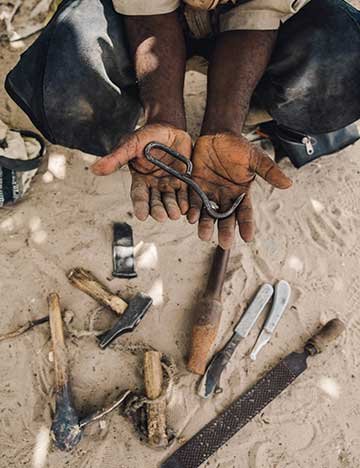Farrier training makes a sustainable difference in Senegal
Brooke helps a traditional farrier learn new ways of working.

For over 20 years, farrier Ablaye Cisse from Sokone in Senegal used a hammer and a large knife to trim hooves, a practice which often caused injuries and distress to the animals.
But for the last two years, Ablaye has been working with Brooke to learn new farriery skills.
“My skills have definitely improved. I have learnt new techniques which I am applying, going from the old ways of working to new ways of working. The new ways require more time and strength but they are better and I have seen a big difference in my work.”
Brooke has helped farriers like Ablaye access locally-made tools to trim the foot and clean the hoof without causing injury. “With the new techniques and new tools I don’t injure the animals. Before when I would finish trimming the animal they would often be bleeding and limping… so I see the importance of having these tools.”
As well as technical farriery, Brooke has also trained Ablaye in animal handling.
Previously nervous around horses, Ablaye didn’t have the skills to safely handle them. Now he feels confident in his ability to handle animals safely and humanely.
I thought the animal must have had a bad experience with a farrier previously and was nervous, so I applied some of the handling techniques I’ve learnt with Brooke
“Yesterday I was called to an owner of two horses; he told me the second horse was difficult to handle. I thought the animal must have had a bad experience with a farrier previously and was nervous, so I applied some of the handling techniques I’ve learnt with Brooke. I approached the horse quietly and washed his feet first so he would get used to me touching his hooves before I began trimming. It took longer but was worth it.”
By training existing farriers like Ablaye, Brooke ensures that high quality local services are available, and engaging animal owners on the importance of hoof care and regular trimming ensures a demand for these services.
Ablaye has also been trained in community engagement and will speak to owners about positive welfare: “Sometimes owners will see me working strenuously on an animal and they ask me why I’m putting so much effort in, why not go back to the old ways? I say no, it is much better this way for the animal.
“I have seen a significant improvement in welfare and the attitudes of owners. The relationship that people have with their animals has improved. Community Change Agents [who run the community training sessions] are able to bring me customers by talking to owners about the importance of farriery and announcing that I am coming to the community as well.”
My confidence has increased in my own abilities. I love horses and now feel like I am making a difference to them.
